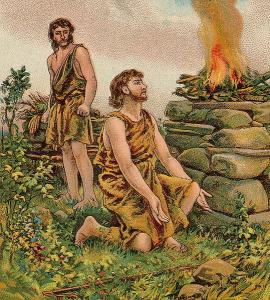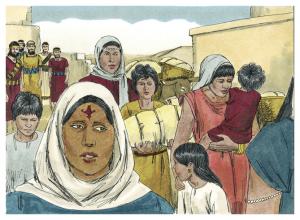
Rivalry looms large in human history. We make ourselves rivals with each other and with God. We even take rivalry into our gift giving, comparing one gift with another. My search for Scriptures that Jesus would have “opened up” for the disciples on the way to Emmaus lands on just such a rivalry. But Jesus, who gave himself on the cross, doesn’t interpret gift giving the way Cain does.
Episode 5 in Opening the Scriptures on the Way to Emmaus: Why Messiah had to Suffer. Introduction and links to other posts in the series here.
In the story of Cain and Abel we see that one of Adam and Eve’s first children engaging in rivalry.
Abel is a keeper of sheep and Cain a tiller of the soil. Both of them decide to offer sacrifice to God Cain offers some fruit of the ground and Abel the firstlings of his flock. He chooses their fat portions as the Bible clarifies, in other words, the best parts. God looks with favor upon Abel’s sacrifice but distains Cain’s offering.
I remember a picture of this event in a book called “Bible History,” from my childhood religion classes. The smoke from Abel’s sacrifice goes straight up to heaven, and Cain’s smoke meanders lazily along the ground. That’s not in the Bible, but it’s a story so I guess it’s fair to add our own details.
Tradition interprets the distinction that God makes between the two sacrifices by saying Abel offered God the best that he had while Cain gave God something less than the best. That Cain gave less than his best is not in the story either. One has to wonder, anyway, why God would require the best. No such command is reported in this story. Indeed, I wonder why God would give a gift and require anything at all in exchange, if it’s really a gift. I’m looking for a deeper source of Cain’s sin than just being stingy.
Cain goes off and sulks, and God gives Cain some fatherly advice: “If you do well, will you not be accepted?” (Notice God doesn’t say Cain’s gift must match Abel’s, just that Cain should “do well.”) Soon Cain invites Abel out into the field, where he murders him.
Responding to a gift: a Cain Way and an Abel Way
I’d like to look in a new direction for motives in this story. When a human person gives a gift, it may be with no strings attached. That is, the person isn’t looking for anything in return. Still the recipient will often offer something in return. It’s not out of a sense of obligation. The original giving was a good thing and humans, being imitative creatures, will sometimes imitate something good. Could it be that Abel’s gift is of that sort, a free response to God, whose giving is without strings?
Meanwhile Cain is thinking in terms of obligation or even rivalry with God. Maybe giving something back to God would put him and God on an even keel? That’s another common way for a human to respond to someone’s gift. We don’t want to be “beholden.” We want to have accounts set right. We sometimes even get into a game of one-upmanship in the matter of giving gifts. A clue to Cain’s attitude is the murderous anger he feels toward Abel. He thinks of Abel (as well as God) as a rival and maybe one he can’t beat.
The spirit of rivalry makes sacrifices go wrong
What does this tell us about offering sacrifice to God? Clearly one thing is that it’s a religious practice that can go wrong. We can imagine we are paying off an obligation to God, either for things we have received or in reparation for sins we have committed. That makes us other Cains and God’s rivals. We’re looking for a way out of an obligation, and most likely the cheapest way.
Jesus didn’t settle for the cheapest way. A drop of his precious blood would have been enough, a teacher once told me, to satisfy God for all the sins humans had ever committed. That Jesus went overboard and gave not the minimum price but all he had, impresses us as an act of superabundant love—so I was taught.
Along the same line, I was taught that Jesus’ sacrifice was a continuation and a perfection of the temple sacrifices of the Old Testament. Those sacrifices were inferior, by comparison. They hadn’t been able to accomplish the complete reconciliation of humanity with God so priests had to repeat them over and over. Jesus’ “perfect” sacrifice sufficed, once and for all, and didn’t need to be repeated. But doesn’t this just make Jesus the perfect Cain. Jesus’ gift gift tops all the others and finally matches God’s own gift.
Surprising God
What if God doesn’t demand a price either for gifts given or for offenses taken? What if the gifts we give to God are truly gifts, not things God expects, but surprises for God? Could that even apply to Jesus’ gift?
A true gift to God is not an obligation we have to fulfill but a worry-free imitating of God’s overflowing goodness. I’m thinking God doesn’t expect Abel’s offering. It’s not taking anything away from God to imagine that God enjoys surprises. I’m thinking Jesus isn’t Cain at all. Jesus didn’t put closure to Old Testament sacrifices by doing them perfectly. Not every Old Testament sacrifice was of the repayment sort anyway. Jesus does something different. Jesus’ offering to God, through his whole life, was gift, not repayment.
If Jesus spoke about Cain and Abel on that walk to Emmaus, it was as much to tell what his suffering was not as to tell what it was. It wasn’t to satisfy God for anything. But what was it for, and what does Jesus’ suffering have to do with salvation? One clue comes with the next story that I imagine Jesus interpreting for the disciples.












